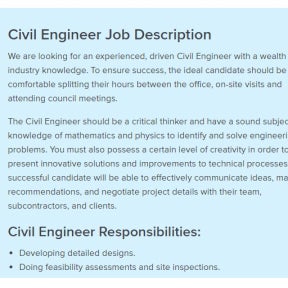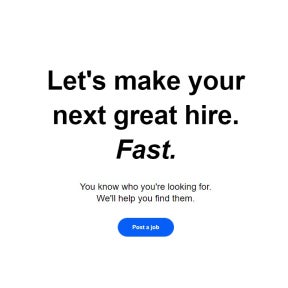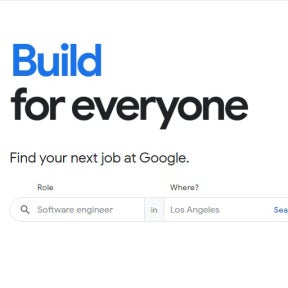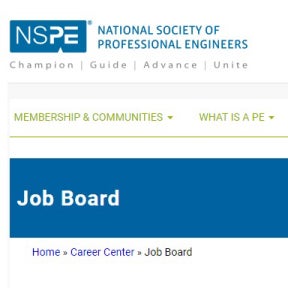How to Find a Qualified Civil Engineer:

A step-by-step guide to finding highly qualified civil engineers for your construction or engineering company. Includes a full hiring process that will help you find the best talent fast.
Sell civil engineers on your company.
Craft a compelling job description.

To catch the eye of civil engineers looking for work in a job market that greatly favors them, write a job ad that celebrates your unique employee value proposition (EVP).
Entice them with details about your company culture, the latest technology you use, benefits and perks you offer, etc. Think about what is important to people and what might convince them to work for you instead of another company.
What civil engineers in the job market are looking for:
- Flexible working hours.
- Opportunities to use the latest technology.
- Above-average starting salary and regular pay increases.
- Opportunities for career growth.
- Paid training.
- Performance bonuses.
- Positive company culture.
- Office location and facilities.
- Training at a professional level.
Use a civil engineer job description template to make it easier.

A civil engineer job description template will provide much of the boilerplate information you'll need, such as responsibilities and qualifications, making your task a bit easier.
Establish an internship program.

One way of plugging the skills gap in your company is by bringing graduates in and training them, giving them the skills you're looking for in the labor market. It might take some time and resources, but a good internship program will attract the best graduates. Once you've trained them and they've had the first-hand experience of what it's like to work at your company, chances are good they'll take a full-time position if you offer it to them.
Use your internship program to create lasting partnerships with the best schools, colleges, and universities. That way your brand becomes associated with these institutions, you have access to the best up-and-coming talent, and you grow your brand awareness.
Should you pay interns? Read the U.S. Department of Labor's fact sheet regarding internships under the Fair Labor Standards Act before deciding what is best for your internship program. Many companies take advantage of the generally accepted idea that interns don't need to be paid. This may be true for some internships, but it's important to make sure you're not breaking any labor laws by withholding payment.
Put someone in charge of the internship program so that they can ensure the interns get the most from the experience.
Give each intern a junior-level mentor for immediate, personalized feedback.
Let the interns know what is expected of them and set goals.
Monitor performance regularly.
Communicate with the interns daily to keep them motivated and focused.
After the internship program comes to an end, maintain a good relationship with the interns leaving the company.
Advertise the position.
Post your job to general sites, such as Indeed.

Start by posting to a general job posting site such as Indeed. These are great places to start because they get plenty of traffic and they're free.
Make sure your job is picked up by Google.

Google for Jobs allows your posting to be seen in search results. This can greatly increase your job visibility. You can get it picked up by Google by having someone properly format it on your website, or by using a service (such as Betterteam) that creates a properly formatted jobs page for you automatically.
Target dedicated job boards for civil engineers.

This will narrow your search to civil engineers who might be a more suitable fit. Use a civil engineering job posting site to advertise vacancies.
Start a social recruiting campaign.

Whether you're looking for young, qualified civil engineers to kick start their careers at your company, or experienced professionals to plug a growing skills gap, social media platforms are a great recruitment tool. They can be used to build an employer brand, increase web presence, and actively recruit talent.
To begin your social recruiting campaign, first craft your overall message. Like your job ad, your social recruiting strategy will heavily rely on your unique employer value proposition. Look at what you have to offer as an employer and then decide how to share that information in interesting ways. It takes time to build an employer brand but it is a powerful tool for attracting talent.
Use social media as an effective recruiting tool.

It's not enough to simply share job openings on social media platforms when searching for civil engineers. To attract the best talent, your posts should be engaging, informative, and professional. Maintain an active presence on social media and respond to any questions, comments, or queries in a timely manner.
Set up separate social media profiles for recruiting.
Post multiple times every day, ensuring that 65% of your posts are original and that 35% of your content comes from other sources.
Use images and videos to highlight your company culture, quality of construction projects, tech, big projects, etc.
Engage as often as possible with your audience by liking and sharing posts.
Ask your current employees to like and share your posts.
For a more active approach, use Facebook and LinkedIn to research and recruit skilled civil engineers from competitors, identify potential employees working in similar fields, and target recent graduates.
Ask employees for referrals.

A great way to find and hire a skilled civil engineer is to ask current employees for referrals. Create an employee referral program to motivate employees to become a part of the recruiting process. Essentially, the program offers rewards for any referrals leading to hires. Make sure it is clear to your employees that the civil engineers they refer should have the right skills, qualifications, work ethic, and attitude.
Vet your candidates.
Screen your applicants.

The next step in finding a good civil engineer to work for you is the screening process. This will include a screening email, a short phone interview, a test, and then a final interview held in person.
If your efforts to hire civil engineers have gone well thus far, you'll likely receive several applications. You'll need to separate the applicants who are the most serious about the position from those who are less serious. To do this, send each applicant an email thanking them for their application, and include in the email five questions they need to answer within a certain timeframe. The questions could include:
- What interests you most about this position?
- How long have you been a civil engineer?
- What is the biggest project you have worked on?
- How do you prepare for creative pitches?
- How would you describe the main responsibilities of a civil engineer?
Those applicants who take the time to respond with thoughtful answers are serious about the position. Many applicants won't respond at all. This applicant screening email not only identifies serious applicants, but it also identifies which of them are best suited for the position and can go through to the next phase of the screening process.
Conduct background checks.

Once you've narrowed your candidate pool, you'll need to conduct background checks to verify their employment history, application details, criminal record, and more. Read our guide to the best background checking services for new hires.
Conduct interviews.
Conduct a phone interview.

Now that you've selected a few of the applicants to move on to the next round of screening, contact them to schedule a phone interview. The interview should be about 15 minutes long and should cover salary, qualifications, experience, and work history. Read our guide on how to conduct a phone interview to get the most out of the interviews.
Example questions:
- What do you expect for a salary?
- Why did you leave your previous employer?
- How did you find out about this position?
- What made you decide to become a civil engineer?
- Why do you want to work for us?
- What qualities make a good civil engineer?
When interviewing an applicant, have a copy of their applicant screening email interview answers with you so you can check to see that the answers given during the phone interview support those given in the email.
Listen carefully to how the applicant communicates.
Be wary of applicants who seem insecure and disorganized.
Schedule a test and final interview.

The last step in finding a civil engineer to work at your company involves a test and an in-person interview. While the applicants' resumes and the preliminary interviews will have told you some of what you need to know to decide who to hire, a test will tell you who is truly capable, and the interview, who will fit in. Arrange a time for each applicant to come in for the final phase of the screening process.
The test should be designed to assess the applicant's ability to perform the duties of a civil engineer at your company using role-based questions. The test should measure the following:
- Technical knowledge.
- Mathematical proficiency.
- Analytical skills.
- Problem-solving skills.
- Creative thinking.
- Ability to assess risk.
- Ability to read and understand data.
- Communication skills.
After the test, conduct the in-person interview. Read through civil engineer interview questions for some suggestions about questions to ask.
Be sure to allow the applicant to ask any questions they might have about your company, the position, etc.
Use the interview to further sell the position to the applicant so that when you make them an offer, they won't hesitate to accept.
Hire your new civil engineer.
Make an offer.

Finding skilled civil engineers in a very competitive market is proving difficult for most companies, so when you find one that is perfect for a position at your company you must act fast. Call the applicant to tell them the job is theirs and then send them a job offer letter that explains everything you're offering and what they can expect to happen next.
Use our job offer letter template to craft a compelling and professional letter.
Onboard your new civil engineer.

Onboarding is a key final step in the hiring process that is not to be overlooked. Make a good first impression and get the new hire up and running fast by having a detailed and organized onboarding process.



